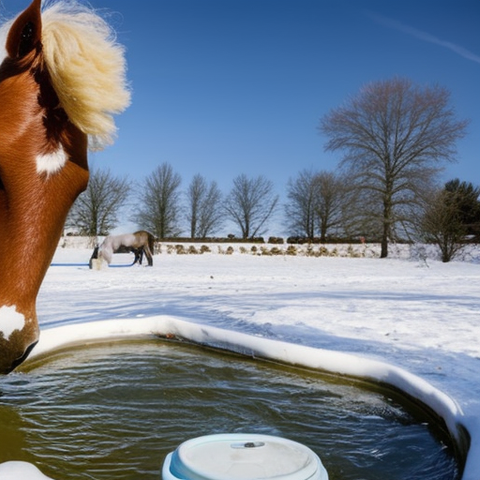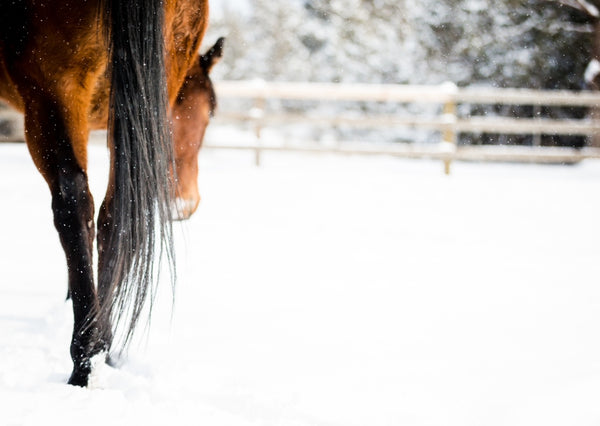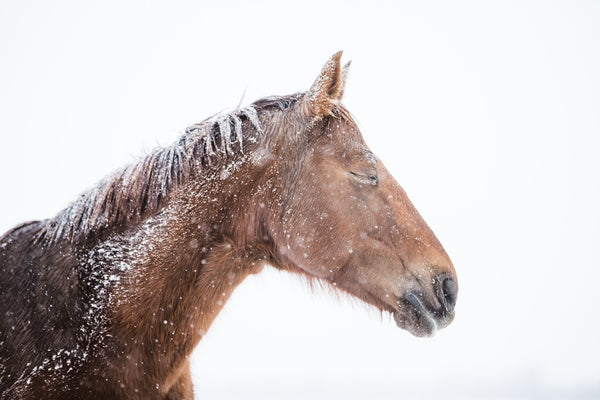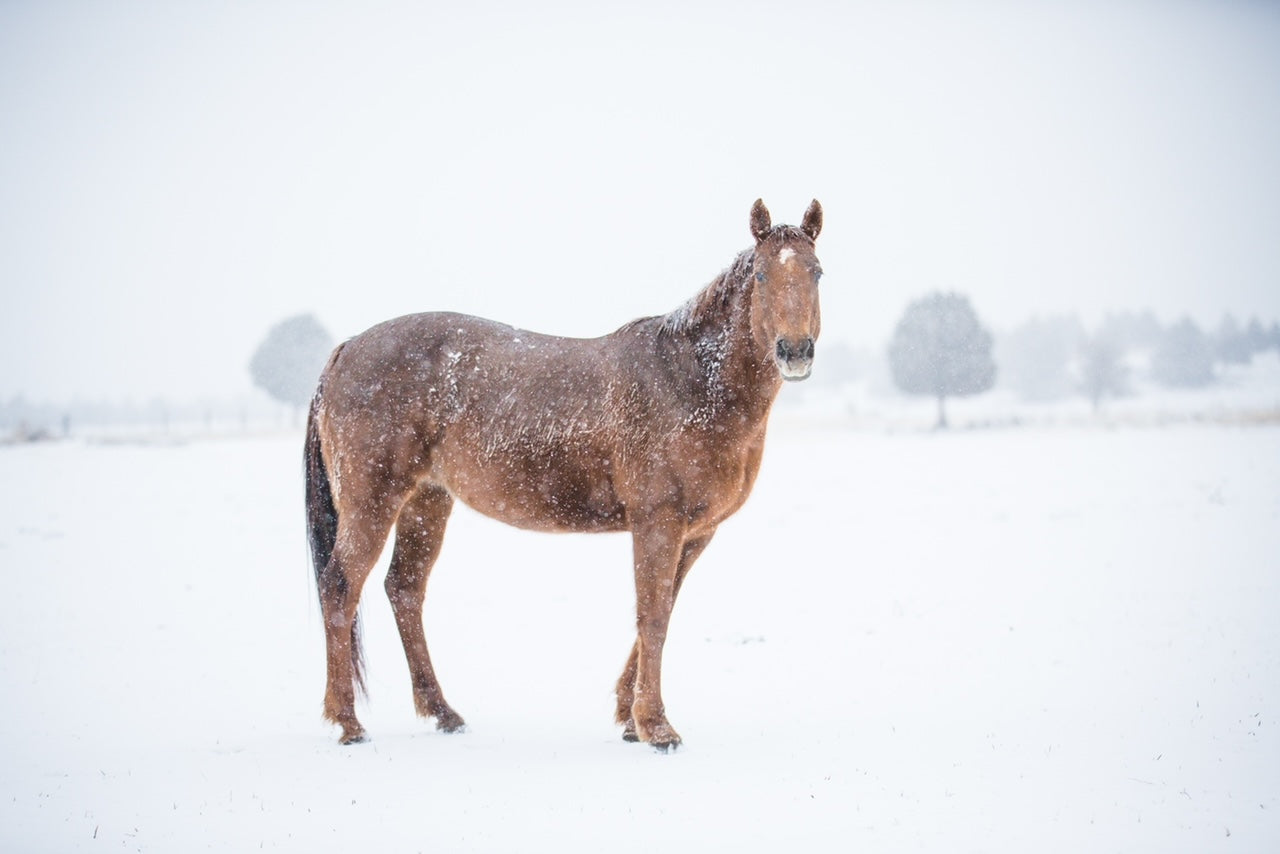Winter can be a challenging time for horse owners. As temperatures drop and snow begins to fall, it's important to take extra care of our beloved equine companions. Cold weather and harsh conditions can pose various health risks to horses if not properly addressed.Some horses need a little extra help in order to stay in their best fighting shape during the winter months.In this comprehensive guide, we will explore the key issues that affect horses in winter and provide expert tips and strategies to ensure their well-being throughout the colder months.
Hydration: Preventing Dehydration in Winter
Dehydration is a concern not only in the scorching summer months but also during winter. Horses require a significant amount of water to maintain optimal health, with a typical 1000 lb horse needing 7-12 gallons of water daily.

However, frozen buckets and freezing cold water are common culprits for dehydration in winter. It's crucial to prevent water sources from icing over and ensure that horses have access to clean and warmed water.
If your horse doesn’t drink enough water, it may become prone to impaction colic. Here are some tips to help prevent dehydration in your horses:
- Use heated automatic waterers, immersion heaters, or insulated buckets. If you don’t have an electrical source then use a Jolly ball to float in the trough so the horses can nuzzle it leaving a muzzle-sized drinking hole.
- Horses will drink more water if it is warmed (Research has shown that horses whose water source is warmed to 66 degrees Fahrenheit drank 40% more water than horses with water near freezing temperatures).
- Make sure your horse has free choice salt available.
- Soak pelleted feed.
- Check their water regularly to ensure it has not iced over or become too cold.
- Always provide clean water regardless of temperature.
- Be cautious when using water heaters, checking for any damage or electrical issues.
- Consider adding flavoring, such as apple juice, to encourage horses to drink more.
Maintaining Body Condition: Preventing Weight Loss in Winter
Some horses need a little extra help to maintain weight during the winter. Whether your horse is a performance horse that lost weight from competing and practicing throughout the Summer months, or you have a hard keeper that struggles to keep weight on it is important to address all issues associated with horses struggling to maintain their weight.
As the temperatures drop thinner horses do not have the fat stores in their bodies to insulate themselves from the cold. This can create a vicious cycle if your horse does not have enough fat to protect themselves from the cold. If they get cold they will shiver to keep warm burning more energy and resulting in them becoming thinner. It is essential that we do all we can to ensure our horses have adequate fat stores before winter to ensure this does not occur.
In preparation for the cold winter months bulking up your horse's fat stores can be accomplished through supplementing their diets with a weight gain supplement. Super Weight Gain is our top pick at Horse Guard with a proven combination of increased calories, a gut supplement, and a vitamin-mineral package.
Digestive Health: Supporting Optimal Gastrointestinal Function
Optimizing your horse's gastrointestinal health is essential during winter. Probiotics, prebiotics, and live yeast cultures can help stabilize the gastrointestinal tract and support overall digestive health. This is especially true for hard keepers and senior horses who tend to struggle the most with maintaining weight during the winter months. Here's how you can ensure your horse's gut is in top shape:
- Provide probiotics, which are live bacteria that help stabilize the gastrointestinal tract and fend off disease-causing microorganisms.
- Ensure your gut supplement contains prebiotics in the diet to nourish and promote the growth of beneficial microorganisms in the gastrointestinal tract.
- Pick a gut supplement with live yeast cultures to stabilize the cecum's pH levels, and further support the gastrointestinal tract.
- Feed a high-protein and high-fat diet to promote proper digestive function.
- Regularly monitor your horse's digestive health, watching for signs of discomfort or irregularities in manure consistency.
Protein and Fat
Hard-keepers are typically more nervous than easy-keepers and therefore it is important that you provide a concentrate that is high in protein and fat rather than carbohydrates.
Protein and fat are considered “cool energy” which is better for your horse to metabolize into weight and muscle gain. In addition, fat provides 2.5 times the amount of calories than protein or carbohydrates, so each ounce of fat goes further. Extruded soybeans are an excellent source of high protein and fat.
Vitamin E
Horses with less-than-ideal body conditions have a tendency to be deficient in one or more vitamins and minerals which make them more prone to disease and stress. Vitamin E is particularly sensitive to body conditions. It works with selenium to serve as an antioxidant in the body, aids in muscle function and recovery, and increases immune function. Vitamin E is a fat-soluble vitamin and is only stored in the fat of the body so if your horse does not have adequate fat stores they will not be able to store adequate amounts of vitamin E.
It is also important to note that as hay is stored vitamin E is oxidized becoming unavailable to your horse. If your horse is eating hay that has been stored for a while and is on the thinner side your horse will likely become vitamin E deficient. With 1,500 IU of Vitamin E per serving, Super Weight Gain has your horse covered.
Shelter and Blanketing: Protecting Your Horse from the Elements
Your horse’s coat is a natural blanket but there are times when blanketing your horse is appropriate to reduce the effect of the cold and inclement weather such as your thin senior horse or a horse that is not acclimated to the cold in order to help maintain their weight. It is important that if your horse is outside the blanket is waterproof. Remember to remove the blanket and groom your horse regularly.
Watch your horse for changes in weight and remember heavy winter coats can often hide weight loss. Sorting horses by age, body condition and nutritional requirements can make feeding groups of horses easier. Read the full article on if blanketing is right for your horse this winter here.


Hoof Care: Maintaining Healthy Hooves in Winter
Horses’ hooves generally grow slower in the winter, but trimming should still occur every 6-12 weeks. It is important to pick your horse’s hooves daily throughout the winter. If it is snowing ensure clumps of snow are not building up. These clumps can cause significant pain and damage to a horse’s hoof.
Using a supplement such as Hoof & Hair Guard, Equine Hoof Guard or Biotin Hoof Blast will also help to keep your horse’s hooves happy and healthy throughout the winter months. Check out Horse Guard’s line of Hoof Supplements rich with all of the vitamins and minerals your horse needs to keep its hooves healthy.
Coat Health: Grooming in Winter

It is important to continue to groom your horse throughout the winter months. It
helps to remove mud, ice, snow, and dirt which can latch onto your horse’s coat and clump up. These clumps can get hard and irritate the skin and possibly lead to infections. Grooming also helps to improve circulation and warms up your horse as a result. Also consider adding a supplement such as Flaxen Flow, Flaxen Glow, or Hoof & Hair Guard to keep your horse’s coat happy and shiny through the cold winter.
Feeding Recommendations: Adjusting Hay Intake in Winter
Proper nutrition is crucial for horses year-round, but winter brings specific challenges that require adjustments to their feeding regimen. Here's how to ensure your horse receives adequate nutrition during the colder months:
- Increase hay intake during extreme cold weather to provide additional calories and help horses generate body heat.
- Monitor your horse's weight closely and adjust hay amounts accordingly to prevent weight loss.
- Provide good-quality hay that is free from mold, dust, and other contaminants.
- Consider using slow feeders or small-hole hay nets to prolong feeding time and prevent boredom.
- Consult with an equine nutritionist to develop a feeding plan tailored to your horse's specific needs.
Your winter daily checklist
- Provide your horse with warm water
- Feed additional hay during extreme cold
- Perform regular hoof care
- Assess your horse's body condition
- Check their water to make sure it's not frozen

•A complete vitamin-mineral supplementto meet any deficiencies.
•A gut supplement with prebiotics, probiotics, and live yeast cultures to help stabilize the gut flora to help them get more out of the feed they are consuming.
•The cool-energy base of full-fat extruded soybeansare high in protein and fat to help put on weight and build topline.
Supplement your horse's diet daily with Super Weight Gain to prepare them for all of the issues they may face during the winter months. The combination of extruded full-fat soybeans, probiotics, prebiotics, and live yeast, a full dose of vitamins and minerals including Selenium and Vitamin E is the perfect combination to combat all of the winter challenges facing your horse. Taking care of all of these issues in your thin horse should help to ensure that your horse can reach and maintain an optimal body condition year-round.






Leave a comment (all fields required)